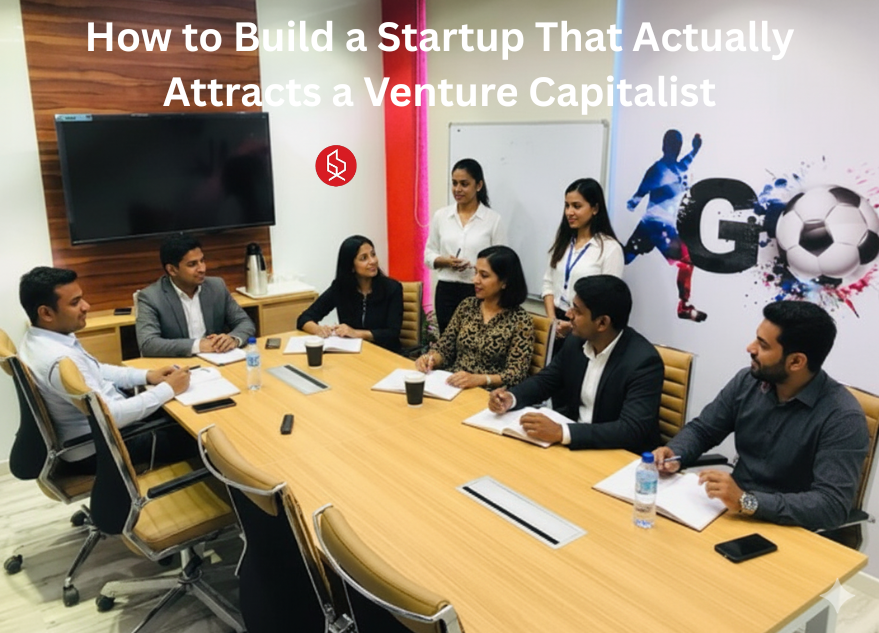Starting a business is exciting, but raising funds can be one of the hardest challenges. If you want to know how to get investors for startup growth, you need to understand what venture capitalists look for.
💡 Are you looking for Coworking space in Gurgaon, Noida or Delhi? We are just a call away. Call Now: 08999 828282
10 Proven Ways to Build a Startup That Attracts Venture Capitalists
- Understand What Venture Capitalists Really Want
- Build a Scalable Business Model
- Build a Strong Team with Complementary Skills
- Validate Your Idea with Real Market Demand
- Master Your Pitch Deck
- Focus on a Large, Growing Market
- Show a Clear Revenue Model
- Build Early Traction Before Seeking Funding
- Network and Build Relationships with Investors
- Be Prepared for Due Diligence
1. Understand What Venture Capitalists Really Want
Before you start pitching to venture capitalists, learn what they value. Venture capital firms usually invest in startups that can scale quickly and bring high returns. They are not just buying into your product; they are investing in your vision, your team, and the size of your market. If your business model doesn’t show growth potential, it will be tough to attract venture capital. Research industries that are currently trending and show strong demand. Tailor your pitch to highlight how your business fits into this landscape and why it has the potential to succeed.

2. Build a Scalable Business Model
If you’re asking, “How to find investors for my startup?”, start by creating a scalable business model. Venture capitalists want to see that your startup can grow without costs rising at the same rate. For example, digital platforms and SaaS businesses scale faster than physical businesses with high overheads. Show how your product or service can reach larger markets, expand quickly, and create recurring revenue. Investors want proof that your company can multiply its profits with the right funding. The more scalable your model looks, the easier it is to secure venture capital for startups.
3. Build a Strong Team with Complementary Skills
Investors often say they invest in people, not just ideas. A skilled team shows you’re serious and prepared. When thinking about how to get venture capital funding, highlight your team’s experience and expertise. Venture capitalists prefer teams with complementary skills, such as a strong technical founder, a marketing expert, and an operations leader. If you lack certain expertise, consider bringing in advisors or co-founders who strengthen your weak areas. A well-rounded team gives investors confidence that you can overcome challenges and grow the business effectively.
Also Read: How to Prepare Your Startup for Early-Stage Funding?
4. Validate Your Idea with Real Market Demand
One of the smartest startup funding strategies is to prove that people actually want your product. Instead of only showing a concept, gather real evidence such as paying customers, surveys, or pre-orders. Venture capitalists want proof of market demand before they commit funds. Demonstrating traction reduces the risk for investors and makes your startup more attractive. Even if your numbers are small, showing steady growth and positive customer feedback can be a strong signal. Always remember: investors trust facts and data more than assumptions or promises.
5. Master Your Pitch Deck
Your pitch deck is often the first thing investors see. To succeed in pitching to venture capitalists, your deck must be clear, simple, and powerful. It should include your problem statement, solution, business model, revenue potential, market size, competition, and team. Keep it short, ideally under 15 slides, with visuals that tell your story. A confusing or lengthy presentation can cause investors to lose interest. Practice your pitch until you can deliver it with confidence. A strong deck can make the difference between rejection and securing venture capital for startups.
6. Focus on a Large, Growing Market
When asking, “How to get investors for startup growth?”, remember that investors care about market size. Venture capitalists prefer industries with billions in potential, where even a small share can mean big profits. Show that your target audience is not only large but also growing. Use credible research, statistics, and market reports to prove your point. If your startup is solving a niche problem with a limited market, funding will be harder to get. Investors want confidence that your idea can expand across regions, industries, or customer segments.
7. Show a Clear Revenue Model
One major factor in how to get venture capital funding is a clear path to revenue. Investors are not looking for vague ideas; they want to know how your startup makes money. Whether it’s subscriptions, direct sales, or ad-based income, your revenue model must be realistic and repeatable. Avoid relying only on future projections—show actual customer conversions, pricing strategies, and profit margins. The clearer your business model, the more trust you build with venture capitalists. Without a solid plan, even the best ideas may fail to attract investment.
8. Build Early Traction Before Seeking Funding
If you’re wondering, “How to find investors for my startup?”, remember that investors want to see traction. This could be in the form of user sign-ups, app downloads, partnerships, or steady revenue growth. Traction proves that your business can operate successfully even without large funding. Start small, grow steadily, and use free or low-cost channels to build momentum. Once you show consistent progress, venture capitalists are more likely to believe their money will accelerate growth rather than just keep the business alive.
💡 Are you looking for Coworking space in Gurgaon, Noida or Delhi? We are just a call away. Call Now: 08999 828282
9. Network and Build Relationships with Investors
One of the best startup funding strategies is networking. Investors often fund entrepreneurs they know, trust, or have been introduced to by mutual contacts. Attend industry events, startup accelerators, and pitch competitions to meet investors. Build relationships before you need funding, so when the time comes, you already have their attention. Cold emails may work occasionally, but warm introductions are far more effective. The stronger your network, the easier it becomes to attract venture capital when your business is ready.
10. Be Prepared for Due Diligence
After a successful pitch, venture capitalists will carefully check your startup before investing. This process is called due diligence. If you want to know how to get investors for startup success, prepare your financials, legal documents, and business data in advance. Investors will look at your revenue, expenses, customer contracts, intellectual property, and compliance. Being organized shows professionalism and builds trust. Many startups lose deals because they are not ready for this step. Make sure your house is in order before approaching venture capital firms.
Getting venture capital for startups takes preparation, strategy, and persistence. It’s not just about having a great idea—it’s about proving that your business can scale, generate profits, and compete in a large market. By focusing on your team, traction, revenue model, and pitch, you’ll improve your chances of securing funding. Remember, investors are looking for strong opportunities, and your job is to show them that your startup is one of them.
As you prepare for this journey, having the right work environment also plays a crucial role. Flexible coworking spaces like The Office Pass (TOP) give startups affordable, professional offices with access to networking opportunities, collaboration, and resources that investors value. To explore how TOP can support your growth, contact them at 8999 828282 and take the first step toward building credibility and momentum for your startup.
FREQUENTLY ASKED QUESTIONS (FAQS):
Question: How do I get investors for my startup?
Answer: Start by validating your idea, building traction, and preparing a strong pitch deck. Then, network with angel investors, venture capitalists, or through startup accelerators. Investors want proof of growth potential, so show them clear numbers and a scalable model.
Question: What do venture capitalists look for in startups?
Answer: They look for scalability, a large market, a skilled team, and a proven revenue model. Venture capitalists want assurance that their investment will bring high returns within a few years. They focus on businesses with growth potential rather than small, niche ideas.
Question: How can I attract venture capital if my business is new?
Answer: Focus on showing early traction—like customer interest, sign-ups, or partnerships. Even if your revenue is small, proving demand makes you more attractive to investors. Also, highlight your team’s expertise and the size of your target market.
Question: What is the difference between angel investors and venture capitalists?
Answer: Angel investors are individuals who invest smaller amounts in early-stage startups, often in exchange for equity. Venture capitalists are firms that invest larger amounts in businesses with proven growth potential. Startups often begin with angels before approaching venture capital firms.
Question: Do I need a pitch deck to get funding?
Answer: Yes. A pitch deck is one of the most important tools for pitching to venture capitalists. It explains your business idea, market size, revenue model, and team. A clear, engaging deck can help you stand out and secure meetings with investors.
Question: How do I find investors for my startup?
Answer: Use networking events, startup accelerators, online platforms, and industry connections. Building relationships early is crucial. Many investors prefer warm introductions, so try to connect through mutual contacts instead of only cold emails.
Question: What are some effective startup funding strategies?
Answer: Strategies include bootstrapping, crowdfunding, angel investments, venture capital, and strategic partnerships. Many startups begin with self-funding or small investors before moving on to venture capital as the business scales.
Question: How do I prepare for pitching to venture capitalists?
Answer: Create a strong pitch deck, practice your delivery, and be ready to answer tough questions. Focus on your market size, traction, and revenue model. Confidence and clarity are key to winning investor trust.
Question: How do I get venture capital funding if I don’t have revenue yet?
Answer: If you don’t have revenue, show other forms of traction, such as user sign-ups, pilot programs, or partnerships. Emphasize your market potential, competitive edge, and the strength of your team. Some investors fund early-stage ideas if the opportunity looks strong enough.
Question: Is venture capital the only way to fund a startup?
Answer: No. Other options include bootstrapping, crowdfunding, bank loans, government grants, and angel investments. Venture capital is only suitable if you’re building a fast-growing business in a large market. Not every startup needs venture capital to succeed.



